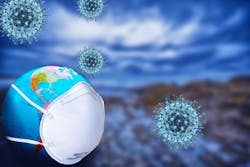SARS-CoV-2 variants evade most – but not all – antibodies
New research indicates that three new, fast-spreading variants of the virus that cause COVID-19 can evade antibodies that work against the original form of the virus that sparked the pandemic. Whether such antibodies were produced in response to vaccination or natural infection, or were purified antibodies intended for use as drugs, the researchers found more antibody is needed to neutralize the new variants, according to news releases.
However, several highly neutralizing monoclonal antibody cocktails, including those developed at Vanderbilt University Medical Center, showed intact or only mildly diminished activity against the variants tested, possibly because they target sites on the spike protein other than the highly mutable E484K residue.
“This study highlights the importance of rationally designed antibody cocktails like those we developed,” said James Crowe Jr., MD, director of the Vanderbilt Vaccine Center (VVC) and Ann Scott Carell Professor in the Departments of Pediatrics and Pathology, Microbiology and Immunology at Vanderbilt.
The findings, from laboratory-based experiments and published in Nature Medicine, suggest that COVID-19 drugs and vaccines developed thus far may become less effective as the new variants become dominant, as experts say they inevitably will. The researchers looked at variants from South Africa (B.1.135), the United Kingdom (B.1.1.7) and Brazil (B.1.1.248, also known as P.1.)
The multi-center research was led by Washington University School of Medicine in St. Louis. In addition to Vanderbilt University Medical Center, University of Texas Medical Branch also participated in the work.
The virus that causes COVID-19, known as SARS-CoV-2, uses a protein called spike to latch onto and get inside cells. Consequently, spike became the prime target for COVID-19 drug and vaccine developers. The three vaccines authorized by the Food and Drug Administration (FDA) for emergency use in the U.S. — made by Pfizer/BioNTech, Moderna and Johnson & Johnson — all target the spike. And potent anti-spike antibodies were selected for development into antibody-based drugs for COVID-19.
The researchers tested the variants against antibodies in the blood of people who had recovered from SARS-CoV-2 infection or were vaccinated with the Pfizer vaccine. They also tested antibodies in the blood of mice, hamsters and monkeys that had been vaccinated with an experimental COVID-19 vaccine, developed at Washington University School of Medicine, that can be given through the nose. The B.1.1.7 (United Kingdom) variant could be neutralized with similar levels of antibodies as were needed to neutralize the original virus. But the other two variants required from 3.5 to 10 times as much antibody for neutralization.
They also tested monoclonal antibodies: mass-produced replicas of individual antibodies that are exceptionally good at neutralizing the original virus. When the researchers tested the new viral variants against a panel of monoclonal antibodies, the results ranged from broadly effective to completely ineffective.
Since each virus variant carried multiple mutations in the spike gene, the researchers created a panel of viruses with single mutations so they could parse out the effect of each mutation. Most of the variation in antibody effectiveness could be attributed to a single amino acid change in the spike protein. This change, called E484K, was found in the B.1.135 (South Africa) and B.1.1.248 (Brazil) variants, but not B.1.1.7 (U.K.).

